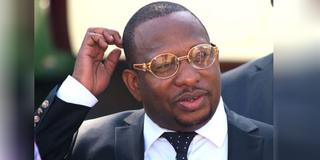Supreme Court was right to bar Sonko from polls

Former Nairobi Governor Mike Sonko.
Few stories have captured the nation’s imagination in recent months as did the former Nairobi Governor Mike Mbuvi Sonko’s court drama.
It took the Supreme Court to stop the reggae that saw Sonko defy every lower court barring him from standing for governor in Kenya’s second city, Mombasa, never mind that, Nairobi, Kenya’s capital, had him impeached on serious integrity issues.
As David Jasondu, a regular contributor to the Nation’s popular ‘Cutting Edge’ column put it, the Supreme Court had “pronounced itself on Chapter Six of the Constitution on integrity, as it was never enacted for cosmetic reasons”. The Law Society of Kenya and activists, he added, “should sue IEBC (the Independent Electoral and Boundaries Commission) for clearing people with integrity queries, ranging from corruption to fake academic credentials”.
It’s instructive that despite academic and regulatory institutions confirming that Nairobi governor candidate Johnson Sakaja used fake academic papers to get IEBC clearance, he remains the United Democratic Alliance (UDA) man.
Halting the Sonko reggae means that the Supreme Court actually does have teeth and can sink them deep, if it so wishes. Which raises the question: What about the other 241 — according to the Nation of June 10 — whose names will appear on tomorrow’s ballots despite the anti-graft agency, the Directorate of Public Prosecutions (DPP) and civil society groups finding them unfit to hold public office?
Chapter Six of the Constitution of Kenya 2010 is clear on who is disqualified from holding public office. However, until the recent Supreme Court decision to lock out Sonko over conduct that contravenes the Constitution, the supreme law seems to have been observed more in breach than in compliance. Sadly, clearing of crooked leaders should never happen if the three arms of government — the Executive, the Legislature and the Judiciary — work in complementarity.
What went so wrong for Kenya to find itself in a position where as many as 241 candidates can be cleared to run for public office in total contravention of the Constitution?
Yours truly talked to Ms Salome Muigai, who sat on the Constitution of Kenya Review Commission (CKRC) that was chaired by Prof Yash Pal Ghai to understand how the courts could clear persons in contravention of Chapter Six of the Constitution to run for office. The London School of Economics alumna blames the disjunction between the Constitution and its application on the three arms of government’s understanding of their roles. For, inasmuch as the Executive, the Legislature and the Judiciary are deemed to be independent entities, they ought to view each other in the light of the traditional African three-stone cook-stove, which cannot function in the absence of any one of them.
The three arms of government, she says, are the three stones and should be protecting the pot, which is Kenya. Anything that harms the pot — like allowing impeached persons to continue looting government coffers — is our enemy. Hence, the Supreme Court decision to lock out Sonko was a big win for Kenya, and the same should be replicated in regard to the 241 misfits that are hell-bent to continue misrepresenting Kenyans.
Ms Kweyu is a consultant revise editor with the Daily Nation. [email protected].





